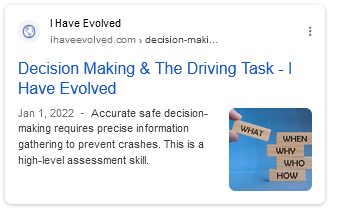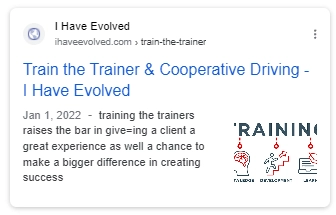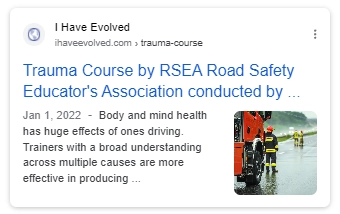The trauma course is designed as a “how-to” course. Most days are theoretical, to give participants an understanding and familiarity with issues and procedures relating to special needs populations and the medical communities. As well they are introduced to research materials dealing with these issues and how to access further research materials.
Other days involve hands-on learning of assessment protocols, counselling techniques, and methodologies employed with these populations.
The Trauma course is a heavy reading course and the first section will be forwarded to the participants three weeks prior to commencement of the program. All participants must choose a population and they may only focus on one group per session of the course. This course is run as a seminar so all individuals are responsible to bring the findings of their literature review to the class for discussion and dialogue.
High-level driving training targeted at senior trainers with extensive training and experience in road safety, driver education, training trainers, fleets trainers, senior driving educators and trainers in both private and public corporations.


Cooper’s 3 BIG Aha Moments During this Training
- Eyes and body have a huge effect
- Multiple crashes but still kept going
- Brains often get lazy in simple situations

EYES and BODY are often overlooked but have huge effects on safety
We did a mountain of assessment for each client including mobility, flexibilty, twisting the body parts around and measuring how far they can twist or not twist plus a ton of eye tests which totally garbbed my attention. We all see so differently and we perceive colours at different positions around out head, which blew my mind how complex we are and how the energineering of traffic controls, reds, greens are well grounded in science and how we humans perceive! This taught me that many drivers struggle are more than just learning the rules and how to control the car.

Multiple crashes but determinations still kept going
One client we worked with left their house in a snow storm slide off the road. Got out and continued down the road to work and a second time again left the road. Again was towed back out onto the road and, yes, continued down the road once more. WOW! I was shocked! Is there no possibility of a light bulb going on inside your head that maybe something is not normal today? Well, the crash that followed involved a transport truck which pinned the client inside their car crushed up against the cement underpass for a few hours in the cold, before they could cut them out of the car! And we were training them to get back into driving again because the insurance company wanted themback to work and off the insurance companies paychecks. This taught me that often, our brains are not always looking out for our best interest and that habits and motivations can often raise the risk and blow away the situation you are standing in.

Many brains get lazy in perceived simple situations
I heard this but never really understood until I started to recall drivers whom were very dangerous in simple situations, yet able to perform 10/10 in complex movements. It was a baffling idea until I heard that some brains, when they think things are easy and simple, they go into lazy mode. Its a natural skill of a brain as it tries to conserve energy, to be ready for the next lion attack. The fact is, a four way stop intersection requires more visual scanning than an advanced left turn signal at a major intersection. REALLY!
Cooper’s Qualifications
British Columbia Training
Ontario Safety League
Road Safety Educators Association
More
Compare this to the training driving instructors receive in B.C.
Instilling a Seriousness for Driving Every Day.









